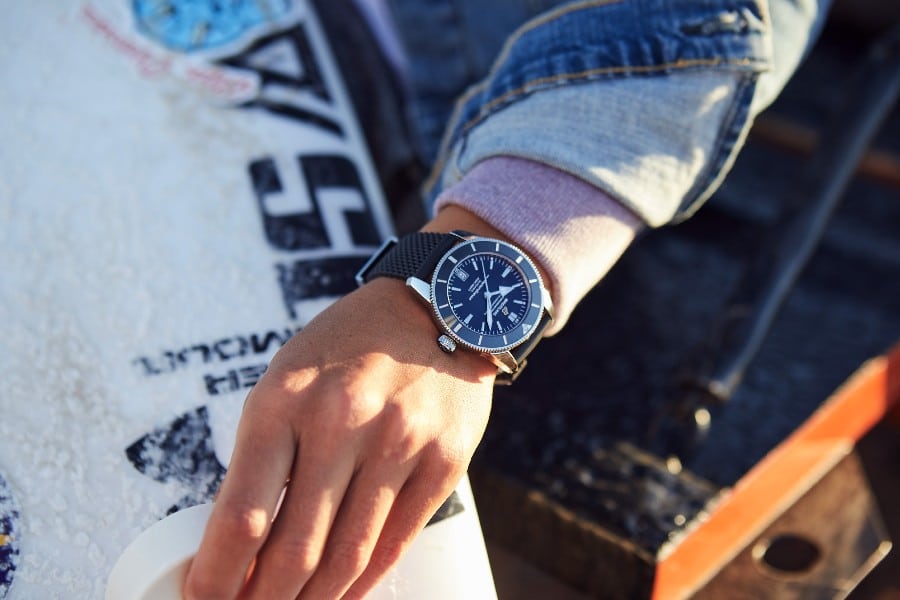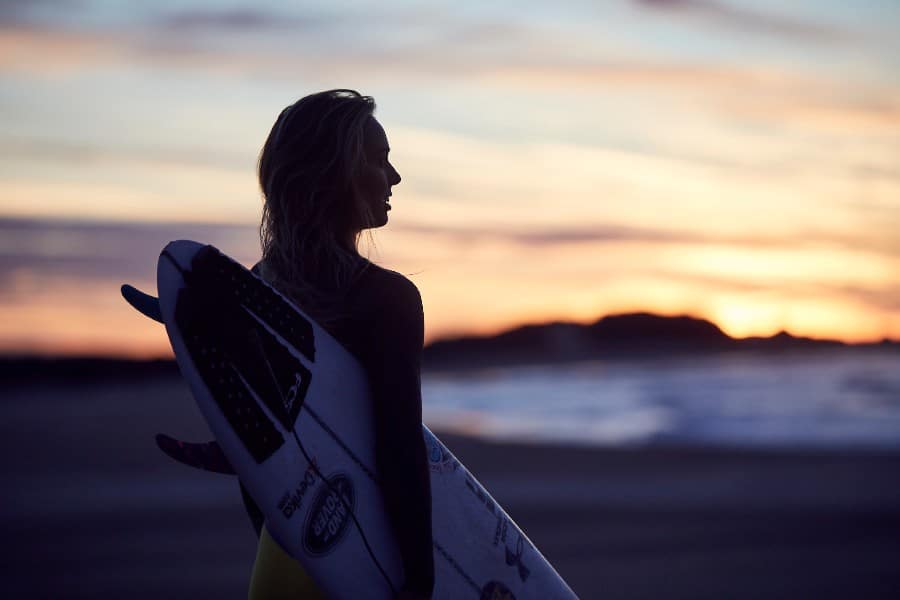
She’s the pro surfer, icon and inspiration for many, who’s an instantly recognisable face in Australian sport. Sally Fitzgibbons has been dominating the top league for 11 seasons and has not let the strain of 2020 slow her down. As a Breitling Ambassador, Fitzgibbons is part of the highly covetable Surfer Squad, amongst other notable names like Kelly Slater and fellow Australian surfer, Stephanie Gilmore. Each member reflects the dynamic values of Breitling, including action, purpose and pioneering spirit.
Here we chat with Sally on staying motivated in this tumultuous year, the new Bretiling female collection, what brings her joy and what it’s like to be a female surfer today.
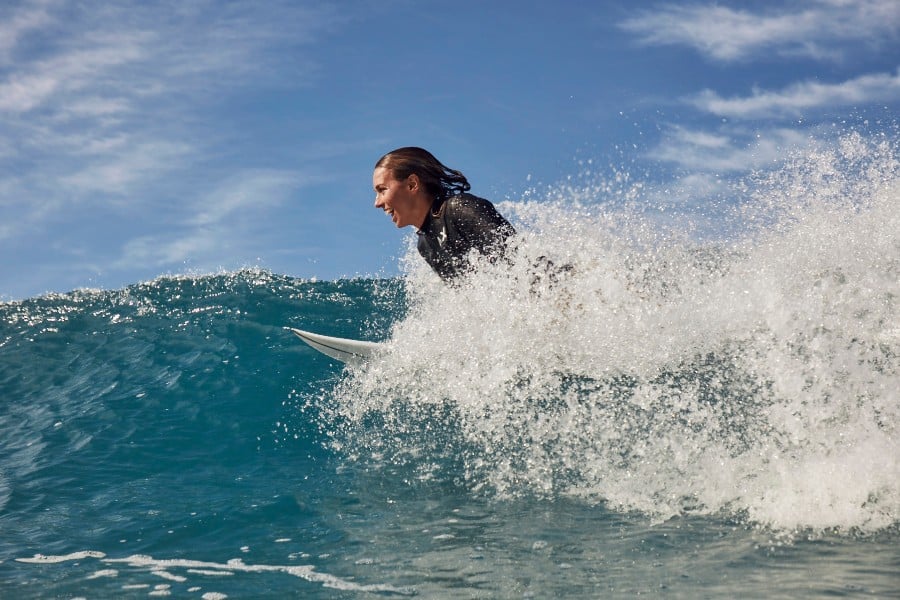
How are you staying active and motivated while life is seemingly on hold this year?
I can see how you get there. I can totally see the future of how you get unmotivated. The only way I thought to get through it after a month of contemplation, was creating a framework. I think, framework and process and that’s what we do best as athletes and we just kind of chunk it all down to achievable little blocks of training… I did this up until I was like 12 or 13 or whatever, and it seemed exciting. So you just go back to your origins, and being at home in a home setting and the waves I’ve grown up in. I think that writes its own story, because I don’t know, you just don't question it? You just feel like oh, well I'm home. So, whatever it is, it is, and I don’t know where this story leads. But that’s when you just keep trusting and I think admitting and owning that it is bizarre and that it is extreme, helps with that.
You previously travelled to competitions all over the globe. How has the surfing world been affected by lockdowns?
Hugely affected. It’s just nonexistent. It stopped, the whole world just stopped. The only remnants left is that you’re training in your own garage gym that you put together like Rocky style, and you’re looking up and you’ve got like memorabilia, and the old trophies… And so that sense of withdrawal from it; maybe that is the break you need to kind of restore everything and rest.
How have the travel bans impacted you personally?
I’m just not travelling, which is wild. Like I realise my relationship with packing to go somewhere. I'm just quite meticulous and especially being female and having a very small suitcase, Mr. Bean style. So, you have to be very committed to the items that you choose, because we have two board bags, we don’t have the luxury of three suitcases. So, I think it’s been cool to live in my wardrobe at home and actually wear clothes of all the colour. But when you do travel, it’s like blacks, whites and greys, because it just has to go with everything. Travel in a sense for me, it is a restrictive process in itself. And it's quite onerous because you're on the traveler’s clock, like you have to be somewhere at a certain time. And I think I added up in terms of last season, if I added up all the travel at once, it was like, two and a half months of nonstop, if you stayed on the plane nonstop, like for two and a half months, that's how much time the whole process of airports and blah, blah, blah, blah, blah. That's the hours I’ve added up to and I was like woah, that’s long. And so, to not do that, and have that kind of open event that I was like woah I can totally connect with community, cook dinners – I love cooking dinners with my family.
How does it feel to be a part of Breitling’s Squad on a Mission, amongst many other creative talents?
The mission is real. I think to be a part of the original squads, like that felt pretty significant and very special. We’re shifting and creating these core values, which is a framework and means that we can come in and operate these missions and it’s all connected. So even when the world pauses like it does now and the spotlights may or may not be on, say ocean health, in cleaning up all the beaches, because we can't travel, it's quite challenging. And as a global team, I can’t wait – we've been isolated squads on a mission. That would be really cool to get back out there.
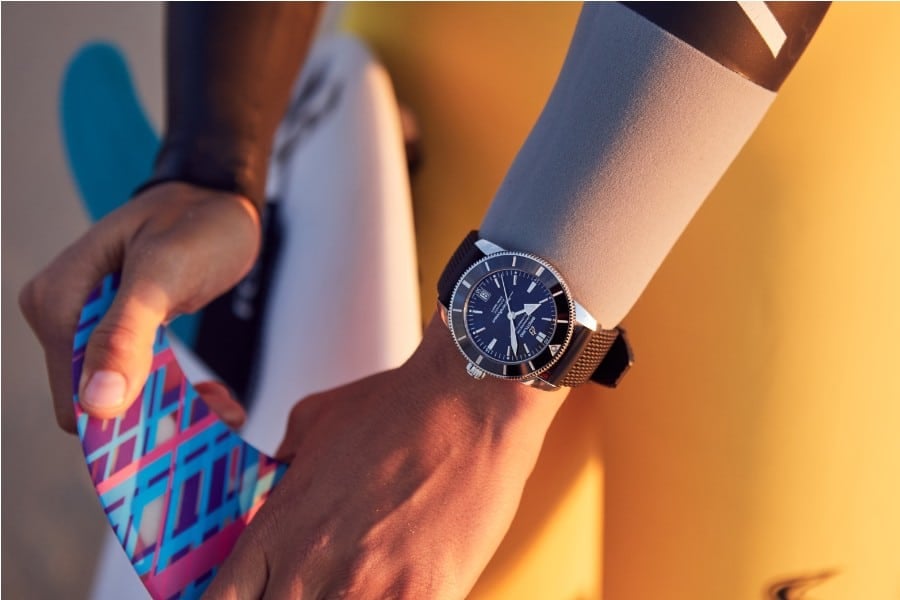
Breitling has a real commitment to clean beaches and oceans, as a member of its Surfer Squad, what does moving towards sustainability and a better planet look like to you?
I think just like my training that I go through, creating a process, and that's something that's sustainable, that, hey, we're going to be doing this and hopefully more towards the course. In the next five years, 10 years, it has to be achievable. We’ve created the squad. We have the teams activated in all the different regions. And, it's all about continually revisiting this concept. I think when you're always searching for new and new ideas, it's like more so kind of stick to the one innovate and imagine and grow and grow and grow.
…But I think that perspective on like, the endgame is like, hey, there has to be change and it has to be pretty, pretty rapid. Because otherwise it’s a slippery slope, like from what we see in terms of when we travel and what we surf in, we see the damage, we see what's happening. We paddle through plastics and plastic bags and stuff in Indonesia. So yeah, it's super sad. And then it's that moment of like ok yeah, I’m apart of doing this small piece on that big global scale.
What’s your favourite feature of the new Breitling female collection, the Chronomat 32 and 36?
It’s that moment. It defines, like we were talking about the modern-day woman is like, there's a moment when you put a timepiece on, and you seriously feel like Superwoman, and maybe it is kind of the bullet bracelet, maybe it gives you that little bit of edge. And I've always been a surfer and being out in the elements and stuff, it always feels like you know, you kind of get your feet in the sand. And you’re kind of going at it in life. But you want to do it in a graceful, elegant way. So, what you wear and how you portray and what your kind of style is and personality? I think you can find that in a timepiece. I don't know, I'm really connected to what’s on my wrist as I’m always training and even when you dress up, you're so used to looking at it. And so that’s the thing, so I think when I'm always pausing or looking or you're drinking a cup of tea, in this case you might be out on the town. But I think yeah, it’s just that moment of feeling strong and fierce. It’s pretty powerful.
On the heritage…
Probably the most significant piece through this last period that I put on, is the super ocean heritage, being the 57 is pretty significant. Because they engraved the 57 on the inside, and that was the year my folks were born too in 1957. And then I think the significance of the rainbow, because that's pretty unique to the range, because there's not a lot of rainbow and color in the range like that. So, it’s sort of that moment where you look down and like we were saying the year we’ve been through. Thinking to yourself like, woah I can imagine in a snapshot every time we looked at it, it reminded you of your 2020 year as like the resilience of a pandemic. But also, I think, this shining light of that there’s so much sacrifice, but yet there's so much like connective tissue that goes into kind of the moment. So yes, I’ve been wearing that watch a lot.
I read that you recently went to Kelly Slater's Surf Ranch in Lemoore, what was it like to catch the world’s longest man-made, open-barrel wave?
Oh, it's exhausting and intimidating and everyone's like, ‘Oh, it's so beautiful’, I'm like, it's the ultimate test. Like playing chess against the computer or surfing against a computer. In terms of riding it, it’s like a phenomenon. And no one gets to take it from you. It’s half the part of the sport, surfing, is battling for your wave. So, everyone thinks like, ‘Oh, you just get whatever wave you want’. You don’t. And then you catch it. And it goes for like, an enormous amount of time, like 800 meters which is like a minute. Just really long. Because most of our waves are like short waves that you surf. Bondi, Maroubra, your wave will be there. Five or 10 seconds like that you’re actually surfing. Yeah, it's a lot. So, like 50 seconds is really far, so your legs are like burning. That’s what I've always loved about Kelly though, because he's been in his craft, his devotion to the craft has lead him, he keeps creating the space to be imaginative. He just imagined that he could put somehow a wave, one of the best waves in the world, in a pool. But I think when you ride something like that, you ride a wave of energy that someone put their heart and soul into it. I can feel that. It’s absolutely insane. And there's no fears of the wildlife. But it's phenomenal. So, we’ll reconvene there this year if all goes well.
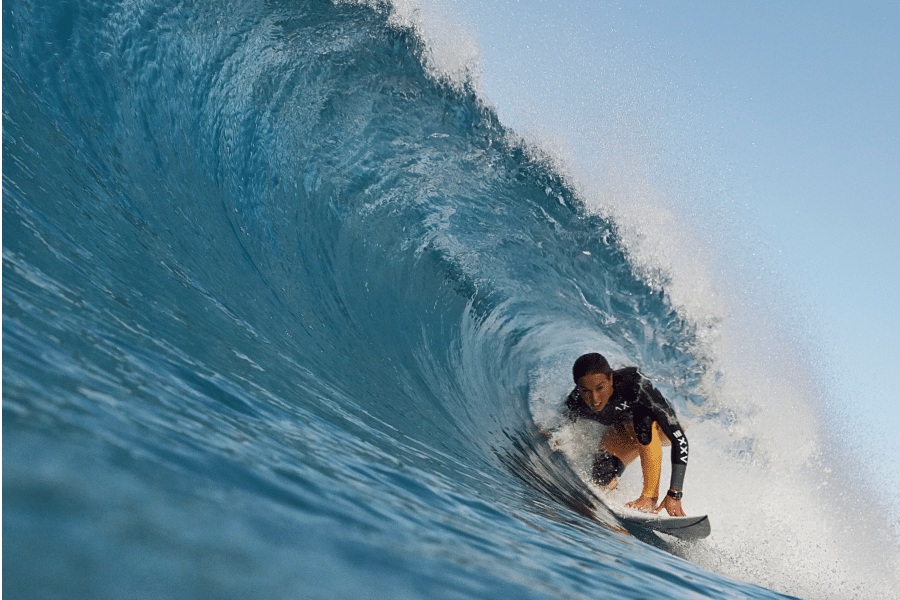
What’s it like to be a female surfer? Are there any gender discrepancies in the surfing industry as there are in so many other industries?
I think there’s always been gender discrepancies in whatever field you’re in. I didn’t know, I just thought it was like, a way of being like, I kind of put my hand up to do a sport, I had three older brothers. But surfing has always been a male dominated industry. But, just to see the change and the progress and be a part of that in my career snapshot. Like to start, where you would show up at an event and the worst conditions imaginable, sometimes the waves weren’t even breaking and they're like, yep, your event’s on, your final is on. And you’re like, ‘Why isn’t the men’s final on?’ I don’t think there’s a wave breaking. And it's like, no, no, that's the expectation like you just show up and don't kind of fight against the system. Just be nice and quiet about it and do your thing and accept it. And then to watch it change to what I'm walking into now where we have our own locker rooms and we're going to waves like to Tahiti this year and we've got equals spots in the Olympic games, and we’re just treated with this respect in terms of our performance. We used to, you know, as a 12- to 14-year-old, we used to kind of try and sell the dream and the lifestyle of the sport of what it meant to be in a bikini on a beach. And now it’s like, if you’re not rocking the best wetsuit tan ever and have cuts and bruises everywhere, it means like, ‘hey, you’re not gonna cut it, you're not gonna make it’ and you probably won't be supported. Because what matters at the end of the day to people is like, ‘Hey, we want to see you drive to the best of your ability’. I didn't think it could come that far in that short amount of time. It's only been like 15 years and it will continue. It's just sort of that moment where you can pause and reflect and go, ‘Hey, I'm actually fighting for change and everything, kind of sit back and watch it change’.
Did it contribute to a more competitive culture between your female competitors? Like you had to work harder to prove a point?
They all worked so hard. The generation I’ve been a part of, it didn't matter if the goalpost was hey, you have to work your butt off outside the competition. With shoots and kind of the lifestyle side of it, in order to gain the money to get back on tour and support yourself to fly around the world to all the events. They still work their butt off. Like I can attest for the Hawaiians, the Europeans, the Australians, everyone's been in it together. And I think that's what drove the sport, the work ethic was there and the desire was there. At the end of the day, we’re surfers and anyone that surfs, whatever has to be done, we’re gonna do it. And so yeah, I've noticed that in terms of this generation, the originals of it that have been around for about 15 years, their personal brands are extremely strong, because no matter where they translate that to, the discipline is there, they show up and be open to change.
Our latest issue is themed around joy, what brings you joy?
God just waking up in the morning.
When have you had to be most courageous?
I think every day, especially in the moment, everyone should register that. Every day you have to be your most courageous because you don't know. The unknown is scary. The unknown is a weird place. And we don't know where like, the pandemic is a pretty good example. Well, where does that lead. Yeah, I think that's that moment you just register and go ok. It's going to be unknown. And it's going to seem scary until you get to interact with it every day. I think it’s pretty crazy.
What’s next for you?
Next for me, ride some waves. Ride some waves, and then you never know where they're going to lead, just ride them. And experience. Just experience it from here and now I think.
